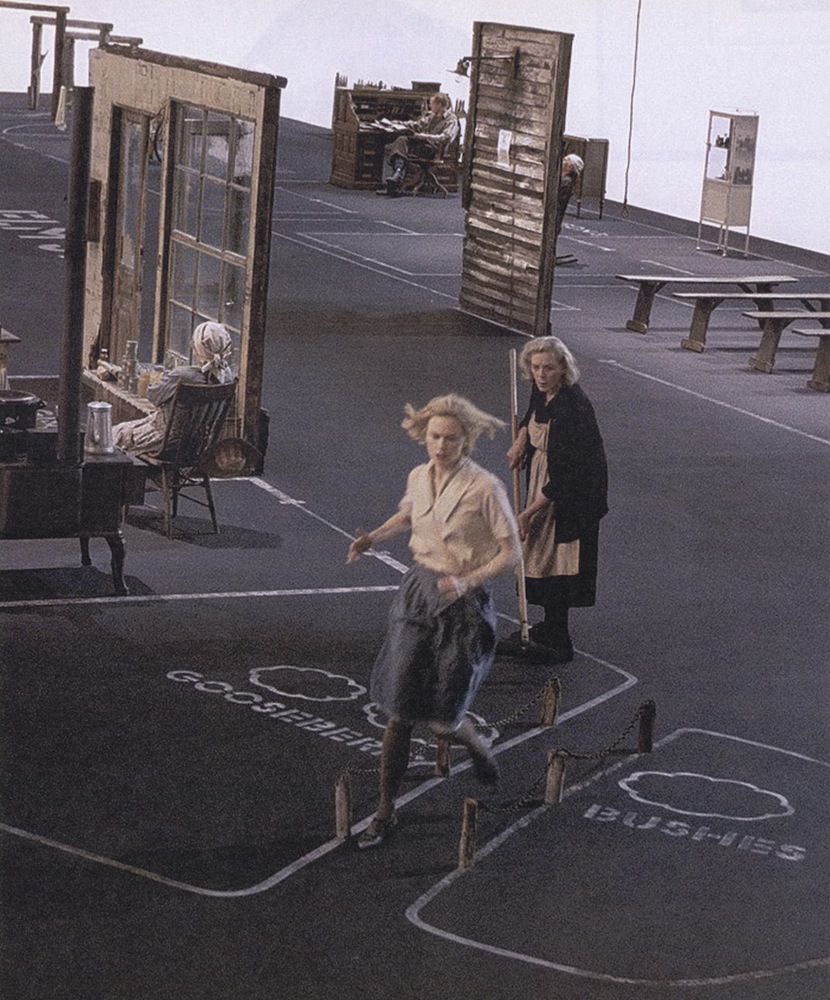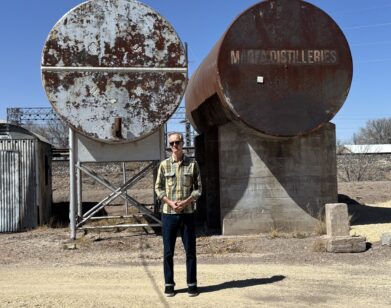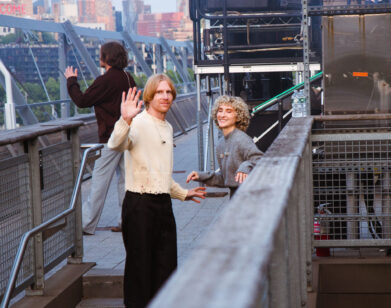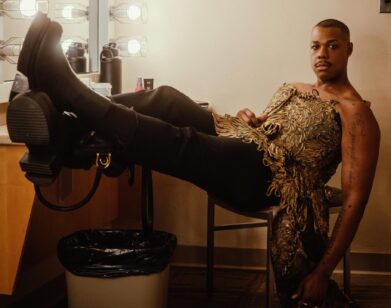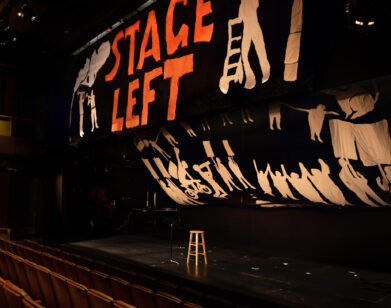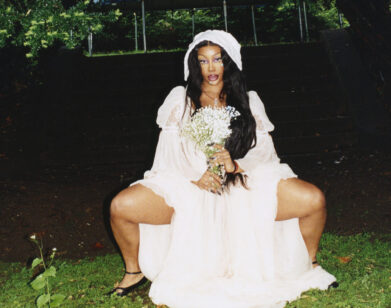Remembering Lauren Bacall
In 1988, when Interview’s Kevin P. Buckley asked Lauren Bacall if she was nostalgic for Hollywood’s Golden Age, she responded, “I am at times, but I have known actors and actresses and people who have just lived for that great moment in the sun that they had once and never again, who never had a life beyond that, and I can’t do that. There’s too much now that interests me.” While Bacall, who passed away last night after suffering a stroke at age 89, may have been best known for her roles in classic film noir works like The Big Sleep, Hollywood was never for her. After 20 years in California, she abandoned film in favor of a career on the stage, appearing in two Tony award-winning musicals, Applause and Woman of the Year. She continued to occasionally appear in movies alongside her theater work, in addition to writing three memoirs entitled Lauren Bacall By Myself, Now, and By Myself and Then Some.
Lauren Bacall, a New York native, was born Betty Joan Perske in the Bronx in 1924. She began her career in the public eye as a model, before she was discovered on the cover of Harper’s Bazaar by Howard Hawks and his wife Slim. Hawks immediately placed the then-19-year-old Bacall in To Have and Have Not, a film based on the Ernest Hemingway novel of the same name, alongside Humphrey Bogart. The two began seeing each other a short while after filming began, and she went on to appear alongside Bogart in The Big Sleep and Dark Passage. The couple wed in 1945 and remained married until Bogart’s death in 1957. But while Bacall was briefly engaged to Frank Sinatra and eventually remarried Jason Robards in 1961 (a short-lived marriage that produced Bacall’s son Sam but ended in 1969), it was “Bogie” against whom she held all other men. “It’s 31 years later and the man still has power for me,” she told Buckley in 1988, during production of Bacall on Bogart, a made-for-TV documentary on the illustrious actor.
But while she said she felt that during her marriage to Bogart, she stood in his shadow, the awards came trickling in throughout her career. She was awarded two Tony awards for Applause and Woman of the Year, a Golden Globe award and Oscar nomination for The Mirror Has Two Faces, and an honorary Academy award for her contribution to the “golden age” of film.
With her instantly recognizable, husky voice, dark eyebrows, porcelain skin and immaculate, gently wavy hair, Bacall was widely regarded as one of the most beautiful women in Hollywood cinema. But she was as much known for her blunt tongue as for her looks—when, in a November 1972 piece for Interview, Pat Ast asked her, “Tell me, Miss Bacall, were you always a great beauty?” Bacall simply responded, “Always.” And at times, her film roles reflected her nature—though perhaps a lesser-acknowledged credit, she voiced the Witch of the Waste in the English dub of Hayao Miyazaki’s Howl’s Moving Castle. “What a tacky little hat shop. I’ve never seen such tacky little hats,” she tells the main character. “Yet you are by far the tackiest thing here.” She spoke out for the treatment of women in Hollywood and staunchly campaigned for political candidates (in the below April 2004 interview with Interview‘s then-executive editor Brad Goldfarb, she’s squarely in the John Kerry camp).
“I don’t like legend. I mean, I don’t like the category,” Bacall told Larry King in 2005. “To me, a legend is something that is not on the Earth.” We’ve pulled out Bacall’s 2004 interview with Goldfarb, in which the two discuss her six decades of performance, her family, and her relationship with the film world, in memory of the incredible actress’s life and career, “legendary” on her own terms at last.
LAUREN BACALL
By Brad Goldfarb
With that voice, that look, and above all that spirit, it’s no wonder this legendary actress is so expert at making waves—and riding them. And as her performances in two daring, cult-ready new movies prove, she’s not about to rest on her laurels.
When the facts surrounding a life are as well known as Lauren Bacall’s, it’s often easy to take them for granted. For starters, there are the fairy-tale circumstances surrounding the launch of her career (she was discovered twice, first as a model by then Harper’s Bazaar fashion editor Diana Vreeland, and a short time later by Hollywood director Howard Hawks and his glamorous hawk-eyed wife, Slim). Then there are her famous and well-documented romances with Humphrey Bogart (two whom she was happily married for 10 years), Frank Sinatra (to whom she was briefly engaged), and Jason Robards (to whom she was also wed, though this time less happily). And, of course, there’s the work: the 36 movies that she infused with her indelible presence, ranging from the smash success of her first few films To Have and Have Not (1944) and The Big Sleep (1946)—in which she co-starred with Bogie and showed what chemistry really is—to her comic turn in How to Marry a Millionaire (1953). And while plenty of actors give lip service to the importance of live theater, Bacall has given her heart to the stage with unforgettable performances in a whole range of productions, including Goodbye Charlie (1959) and Cactus Flower (1965), not to mention the musicals Applause (1970) and Woman of the Year (1981), for which she won Tony Awards. Through it all, however, Bacall has never stopped pushing—be it for better roles, greater respect, or for social change (she’s stumped for Adlai Stevenson and Robert F. Kennedy, among others and is currently sounding the horn for her preferred Democratic presidential candidate: “I’m going to break my ass for John Kerry,” she tells me). Bacall defiantly believes in the responsibility of the individual, as her remarkable 1978 autobiography, By Myself [Knopf] attests. (Note to those who ate it up: More is on the way.) Never one to move through life quietly, it’s easy to imagine that Bacall has ruffled a few feathers in her day, an approach to life that made speaking with her about her two upcoming projects—this month’s Lars von Trier-directed Dogville and Jonathan Glazer’s forthcoming Birth—all the more engaging.
BRAD GOLDFARB: Let’s start by talking about your new film, Dogville. I’m curious how you got together with Lars von Trier on this.
LAUREN BACALL: Well, they contacted my manager, Johnnie Planco, and said they wanted me to be in it. Of course, I was very flattered to be asked by Lars von Trier because I loved Breaking the Waves (1996): It was a brilliant movie, and I thought, God, it must be fascinating to work with him. And I also have a Danish daughter-in-law, so I figured I’d better get to know a few Danes. So I read the script of Dogville, and my part was kind of an incidental one—the film is very much an ensemble piece to begin with. Nicole Kidman is the core of the story, but some of the other actors had real parts. I was part of the town, but I don’t consider that I had much to do. But I’m very glad I did it. At this point in my life I am interested in younger directors and new ideas and things that are unusual. I’m not interested in a lot of the Hollywood hype. I’ll take a little of it, mind you, but I don’t want a lot of it. So to be offered anything like that, the snob in me comes to the top. And thanks to the film my friendship with Nicole Kidman began, and I’m very happy with that because she’s such a great girl.
GOLDFARB: Where did you shoot?
BACALL: We were stuck in Sweden for between six and eight weeks. If we’d been stuck in Stockholm I would have loved it, but unfortunately we were in Trollhättan, a town that’s, how you say, very much on the outskirts. We started in January 2002; it was freezing cold, of course, and there’s no light there in winter. It was a fascinating experience, though. I remember Paul Bettany saying to me at one point, “We have to now unlearn everything we learned about being in the movies.” And in a way that was true of Lars’s technique—you know, he shoots carrying the camera on his shoulder. He had some harness contraption made for him. They get him in it, and he whisks around the set photographing as he pleases. And you never know when you’re in the shot. There were no walls on the set. Everything was just drawn on the floor.
GOLDFARB: It was like a big soundstage, right?
BACALL: I guess so, but it was weird because it doesn’t look like any soundstage I know from California days. It was a very odd, rather grim-looking set: an all-black floor with things drawn into it. Like, my gooseberry bushes and the dog were just drawn in, so one had to adjust to that. And by God we did. Well, there were a bunch of professional actors there, which was terrific.
GOLDFARB: Have you seen the film?
BACALL: I saw it at the New York Film Festival, and I liked it. I had terrible apprehensions about it because it’s so odd. I thought, Oh, my God, they’re going to kill him. But, of course, I didn’t realize what I do now, which is that in Europe, Lars can do no wrong; when the movie was first shown in France they went crazy. I really liked it so much better than I ever expected to—you kind of get caught up in his mood. The narration and the way the times—”one month later,” “three months later”—just flashed on the screen threw me a bit because I got off the track of the story, but he has a reason for doing these things. I don’t know what the reaction is going to be in America because audiences here have never seen anything like it.
GOLDFARB: Some people have suggested that the film is anti-American.
BACALL: When we were in the midst of press conferences, that question was always asked of Lars. They said, “How can you make a movie about America when you’ve never been there?” And, of course, Lars’s answer was perfect. He said, “That is the best way to make a movie about America.” Lars doesn’t travel, you know. He doesn’t fly, and he won’t go on boats or trains. So he’s not seen a lot of other things and other places, but that’s why he’s so creative. But I don’t think Dogville‘s an actively anti-American movie at all.
GOLDFARB: What about the complaint that he’s a misogynist, something else that’s been said of him.
BACALL: I don’t really know. It’s very hard to figure out how a man’s mind works, especially a mind as complicated as Lars’s. [laughs] I never really saw the misogynist side of him. I think maybe women are objects to him in a way. Well, we are to a lot of people still. The feminist movement—forget it.
GOLDFARB: You also have the film Birth coming up.
BACALL: Well, that couldn’t be more different. The film was directed by Jonathan Glazer, this really wonderful young English director who did the film Sexy Beast [2001]—I love that movie. Birth is a very off story as well. I have a hell of a lot better part in it than I do in Dogville, I will tell you. I play Nicole Kidman’s mother, something I’m thrilled to be, I must say. She’s my oldest daughter and my pet, and she’s engaged to Danny Huston. Then this boy, Cameron Bright, comes on the scene, claiming that he’s Nicole’s dead husband. So I am very heavily featured in trying to straighten her out.
GOLDFARB: Mmm. As any mother would. [laughs]
BACALL: Yeah. And how. It’s a pretty far-out notion, you must admit.
GOLDFARB: How was working with Jonathan Glazer?
BACALL: I think he’s extraordinary. I find that there are certain directors like Lars and Jonathan who have creative notions that don’t compare with anyone else’s. And I guess there’s a reason for that. Maybe it’s because they’ve been exposed to art films, so they’re less interested in hype and money than we are. I mean, we have some talented directors in this country, don’t get me wrong. But that kind of far-out creativity does not come from an American mind because we’ve been so schooled in the buck, and that’s our peril. This year has not been a good one for American movies. I think there have been a couple wonderful ones, but for the most part not.
GOLDFARB: That’s interesting because I feel like there were more films this year than usual that really stood out in terms of artistry and performance—Mystic River, Monster, 21 Grams.
BACALL: I like those. I think Clint Eastwood is an amazing talent and much more profound than he’s given credit for. I mean he produced [Mystic River], he directed it, he composed the music—not bad for a giant star like him. I’d love to work with him, but the thing with directors like that is that they have their own concept of what they want and they like certain kinds of people in their movies. I’ve tried to convince Marty Scorsese that I would make a great hood, but he looked at me and said, “You know, you’re not Italian.” I tell you, [laughs] you’re losing to begin with. But their work is certainly worth seeing.
GOLDFARB: Of course, staying in the game is a real challenge for women beyond a certain age. Has that been a struggle for you?
BACALL: Yeah, once you pass the age of 25, you’re in trouble. The preoccupation with youth and with endless trips to the plastic surgeon beginning at age 18 is just horrific. But I’m very lucky. Believe me, I’m grateful every day for the fact that I’m still working, and I intend to keep working until I drop, which I hope will not be today or tomorrow. [laughs] But I think the reason I’ve continued to work is that I’ve never stopped, and also that I’ve spent 20 years starring in plays and musicals and being in the public eye and being able to play the kinds of parts that I never would have been offered in California. No one ever thought of me in any way except the way I was in To Have and Have Not, and naturally one cannot continue that. So I was fortunate in that I was in musicals—the thing I wanted all my life—and hit musicals, as well as the great Broadway comedy Cactus Flower. Even though Bette Davis was my idol I never thought I’d be in movies. And I received recognition for my work in the theater, which I never really did in California.
GOLDFARB: Do you think that’s because the early excitement of your career was so quickly eclipsed by your marriage to Humphrey Bogart?
BACALL: Well, I think the minute I married Bogie I was just considered his wife. My career kind of stopped. Fortunately, I was in some very good movies without him while he was still alive, but after that—boy, I was in some duds. But I got out of that town, and thank God.
GOLDFARB: It sounds like you think leaving saved you.
BACALL: I think it did save me. I was able to go to England and be in a good movie, Flame Over India [1959], and just shake up my life and then come back to New York where my mother and family were. This is where my roots are. I was offered a play here, Goodbye Charlie, and I was thrilled with the idea. It was a perfect reason for me to end up in New York and to put my children in school here. And then once I landed here, that’s where I stayed. And that’s where I had my work opportunities and where I developed as an actress and as a musical performer and as a comedian and all the things that I wanted to be. So I’m grateful to the Broadway theater, God knows.
GOLDFARB: What’s your relationship with Hollywood like today?
BACALL: Well, it’s okay. I go out there because one of my sons lives there, though temporarily, and my daughter lives there, and occasionally I’m asked to do certain things. I’ve presented at the Golden Globes a couple times, but I’m never asked to present at the Academy Awards.
GOLDFARB: Yet you were nominated for an Oscar for The Mirror Has Two Faces [1996].
BACALL: Yeah, well, nobody cares—losers don’t count. I don’t know, they just don’t think of me. What can I tell you? The problem in America as far as actors are concerned—and it’s probably true in other fields, as well—is that they don’t value people who are older or talented. I don’t think ability means anything. How much money you have or how much money you can make for them are the only things they seem to care about or understand. You can’t fight that battle, can you?
GOLDFARN: Clearly, you’re someone who’s not afraid to speak her mind.
BACALL: Oh, yes. I’m not supposed to do that, though. It’s so annoying. And there’s a lot of schmoozing in Hollywood. I mean, I can schmooze with the best of them, but I’m afraid my upbringing makes it difficult sometimes. Not only was my mother honest and believed in characters and in telling the truth, but I married a man who was exactly the same. If anyone asked Bogie about whether he thought a movie was good or not, regardless of whether he was in it, he’d answer honestly. He could not lie, and I’m the same. So I think the only way for me is to try to be in independent movies, which I prefer. They’re not breaking down the doors, you understand, but I have been getting offers.
GOLDFARB: The interesting thing is that when you’ve hit quiet periods in your career, you seem to take matters into your own hands. For example, you change locations, you move from film to the theater, you write a book.
BACALL: Well, because I’m not a sedentary human being, and in a way it’s kept me going. It keeps you doing other things so you can function and use your mind and body as best you can. It’s more complicated as you get older, but still, you can do it. And damn it, as long as I can do it, I sure as hell am going to.
GOLDFARB: My last question: Have you had the career that you imagined for yourself, when you were a girl in New York dreaming of—
BACALL: —A white Christmas? [laughs] Well, you know, I envisioned myself as making it on the stage, and I never thought of myself in terms of domesticity. I never imagined I would meet anyone like Bogie and marry him and have children. And obviously, the minute I fell in love with him that’s all I wanted. Then, of course, after we were married I wanted more. But I was a kid. I was 19 when I met him, so I mean, what the hell? How much did I know? And I was really innocent.
GOLDFARB: It’s pretty extraordinary to discover that so young, or at all.
BACALL: Absolutely. I was insanely lucky. Although I beef about a lot of things in my life, I think I’ve been extremely lucky. And even lucky to have married Jason Robards after Bogie—you know, after having such a great marriage and then having a not-so-great one. But still, he was a terrific man. He had his problems, which was what killed our marriage, but aside from that he was a worthwhile human being. And we have a son who’s an extraordinary man in his own right. So I think I’m damn lucky. I’m lucky that my kids are all straight, that they haven’t ended up in jail, that they’re all worthwhile human beings, thank God. Their lives are happy; they have happy partners, wives, husbands. See, my mother wanted me to have more than she had, and I wanted the same for my kids. So I don’t envision anything for the future, and I never really have. [laughs] I just hope good things keep coming.

